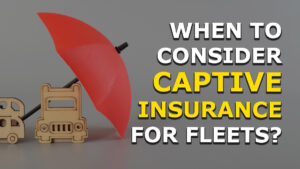The biggest issue carriers make when approaching insurance renewals is they assume they are writing a Tinder dating profile.
The problem is your would-be date already ran a background check, talked to your parents, and found all of the skeletons in your closet.
How do underwriters accomplish this?
By looking at your CAB report.
Never heard of it? Then it is time we break down what a CAB report is, what information is collected, and how to take advantage of it.
What is a CAB report?
The Central Analysis Bureau or CAB is a private company, recently acquired by Randall-Reilly in March 2021, that gathers DOT inspections and violations from various proprietary and government sources and then inputs them into a database before averaging them against other companies.
The point of the CAB report is to provide up-to-date information regarding a carrier’s finances, safety, and operation.
Your CAB score informs insurers what type of risk profile you have so they can decide premium prices based on the risk.
But why do they use CAB versus a carrier’s SAFER score?
Well, SAFER is like your basic Tinder dating profile where CAB is your complete background check available for everyone to see.
SAFER is a free tool provided by FMCSA that gives a very brief snapshot of information that is pulled from various government databases. Since it is only a snapshot, it will not give the best picture of a carrier’s operations and inspection history.
FREE GUIDE | 7 Steps To Start and Run A Successful Trucking Company
This is why underwriters are moving away from SAFER and towards using the information from CAB.
What information is collected in a CAB report?
Underwriters want a complete risk and safety history story.
So, not only will they look at the DOT rating, but they will also look at any other information they can pull from online.
The CAB report includes the following data:
- Basic FMCSA information: business name, DOT number, MC number, contact information
- Past insurance carriers, coverage history, and if it was cancelled and why
- How many power units running and miles driven
- Carrier operation and classification (i.e., interstate carrier authorized for-hire)
- Cargo carried
- ISS Safety Score
- Out-of-service (OOS) violations
- How many driver, vehicle or hazmat inspections you had
- Detailed driver, vehicle, and hazmat violations from the inspections
- Accident history and injury reports
- Radius of operation and state’s traveled history
- minor or severe violations (spare tire violation, overweight violation, false logs, maintenance issues, etc)
- other DOT’s you are associated with
- other vehicle histories you are associated with
All of this data is compiled together, and a score is created based on how many red flags your information has.
Then your score is compared with other carriers so they can decide what to charge or whether to insure you at all.
Here is a video from a CAB report back in 2016.
4 Ways to Improve Your CAB Score
First, tell the truth.
All this information if available to underwriters. If the information they find in the CAB report does not line up with the information you are telling them, you can expect a handful of questions that need to be answered before they offer a quote.
For example, the total power units you have is very important, because you may want a quote for one truck, but underwriters see you have 5 unique VINs.
They will ask questions about the other 4 vehicles, such as: Were the other vehicle leases terminated? Were the vehicles sold?
For a “new carrier”, you may have closed a previous company because it was not managed well. Then you started a new venture in hopes to start from a “clean slate”.
When an underwriter pulls the CAB report, they will see that you had a prior LLC, see who the owners were, and see that you are a chameleon carrier.
An underwriter will immediately say, “Hey, you are associated with this other trucking company, what’s up?”
Just like with a dating profile, telling the truth matters. Underwriters will stop quotes or not even start a quote if they see questionable history.
Second, document everything.
If the CAB report finds a past trend of driver violations or maintenance issues, having data to prove you are aware of these issues and taking care of it is important.
But you must provide documented proof that these things are being taken care of to appease underwriters.
For example, underwriters know that the first 90-120 days is critical to new-hire driver safety no matter how experienced the driver.
As a carrier, you must document why you are hiring certain drivers, driver orientation information, your driver retention strategy, and what type of driver training is being implemented.
If a driver is having certain violations, proactive driver training is paramount. You must document that you are aware of the trend, what you are going to do to fix it, who is taking care of it, and any proactive driver training certificates that can prove progress on this issue.
Similarly, if there are frequent light or brake violations, document what the maintenance program is doing to fix these issues and document pre-inspection reports or offer proactive driver training on how to have a thorough pre- and post-inspection.
Third, update your carrier information before your insurance renewal.
Carriers should be preparing for renewals 3-4 months out, especially if you are going to change your operation. If you are making changes, be sure to call the FMCSA and update that information on their website before you call for an insurance quote.
This process is simple.
- Know what information is on your FMCSA account (SAFER, MVRs, PSP reports, etc.)
- Update the vehicle, location, cargo type, and other information when changes happen
- Correct the wrong FMCSA data or violation history with the Data Q process
- Prepare for what insurance options you want, such as deductibles, captives, coverage, etc.
- Then, now fully prepared, ask for an insurance quote at least 3 months out
Fourth, establish a culture of safety to reduce inspection violations
How well you perform during a roadside or other DOT inspection is critical. Underwriters dig deep into inspection data so they can gauge how well your operation is running.
While documenting everything is extremely important, so is “operational” safety.
This means having the right safety policies and procedures in place across the entire company that establishes your safety culture.
Don’t know where to begin?
Have a third party come in to run a mock DOT inspection. These experts can find potential violations, offer suggestions on how to improve, and help you prevent future violations or accidents before they happen.
Then take it a step further by implementing smart safety technology.
Fleet monitoring has contributed enormously to lower CAB scores, but it will take time because adding technology alone does not do anything.
Companies are not seeing benefits quickly because insurance looks backwards at safety data. It will be year two before you see benefits of implementing safety technology.
However, you could see benefits in the first year if you proactively manage the safety data and none of this data talks to each other, so how you use and document it is very important.
Some of this data includes:
- Camera data
- ELD telematic data (harsh braking event, speeding, etc.)
- Learning management systems (LMS)
- and so much more
How we keep trucking company rates down
At CNS Insurance, we assist trucking companies and haulers of all types, providing them with the best insurance rates with A or A+ rated companies along with the necessary compliance advice that comes with owning a trucking company.
Our partner, Compliance Navigation Specialists, is an industry leading compliance company that will help keep you in compliance and commercial insurance rates low.
CNS offers several different program levels depending on the size of your organization, however the PSM Motor Carrier Program is more common when considering affordability and the comprehensive DOT compliance assistance.
The PSM Motor Carrier Program includes:
- DOT audit support
- ELD management
- Driver Qualification File (DQF) Management
- New driver on-boarding
- Driver safety meetings
- CSA score management
- Policies and handbooks
- Vehicle maintenance
- and more
Learn more about our DOT Compliance Programs
For more information, contact CNS at 888.260.9448 or info@cnsprotects.com.
Need an Insurance Quote?
Allow one of our Commercial Trucking Insurance Specialist pull multiple insurance quotes for you to find the best rates.
It never hurts to get a quote and try saving money on your insurance premiums.
Give us a call anytime and we can discuss lowering your premiums or getting a quote to see where you stand.
Before we can get you an estimate, we are going to need some information.
Fill out a complete quote or quick quote to get started.
If you have any questions or concerns, please call us at 800.724.5523 or email info@cnsinsures.com.






